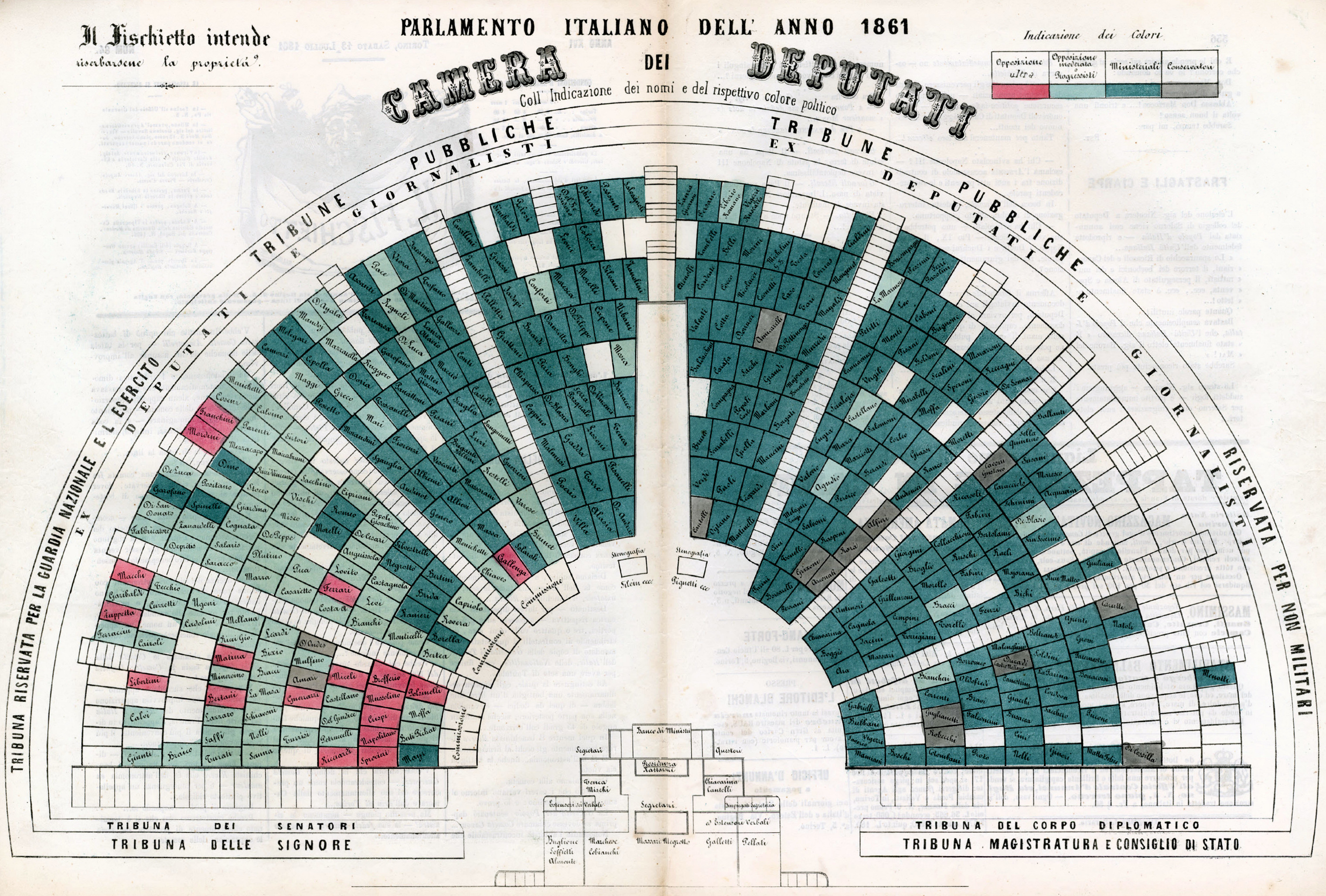1861 Italian General Election on:
[Wikipedia]
[Google]
[Amazon]
General elections were held in Italy on 27 January 1861, with a second round on 3 February.
 Right-wing candidates emerged as the largest bloc in Parliament with around 43% of the 443 seats. They were largely aristocrats representing rentiers from the north of the country, and held moderate political views including loyalty to the crown and low government spending.Nohlen & Stöver, p. 1028 The right-wing leader Camillo Benso di Cavour was elected as the first Prime Minister in the history of Italy.
Right-wing candidates emerged as the largest bloc in Parliament with around 43% of the 443 seats. They were largely aristocrats representing rentiers from the north of the country, and held moderate political views including loyalty to the crown and low government spending.Nohlen & Stöver, p. 1028 The right-wing leader Camillo Benso di Cavour was elected as the first Prime Minister in the history of Italy.
Dieter Nohlen
Dieter Nohlen (born 6 November 1939) is a German academic and political scientist. He currently holds the position of Emeritus Professor of Political Science in the Faculty of Economic and Social Sciences of the University of Heidelberg. An expe ...
& Philip Stöver (2010) ''Elections in Europe: A data handbook'', p. 1047 The newly elected Parliament first convened in Turin on 4 March 1861, where, thirteen days later, it declared the unification of the country as the Kingdom of Italy.Nohlen & Stöver, p. 1027
The elections were carried out according to the 1848 electoral law of the Kingdom of Sardinia, in which only literate men over the age of 25 and paying a certain level of taxation were allowed to vote. Candidates were elected in single member constituencies, with a second round required in cases when no candidates received over 50% of the vote or the equivalent of one-third of the registered voters in the constituency.Nohlen & Stöver, p. 1039 The Pope demanded that Catholics did not take part in the elections.
Campaign
TheHistorical Right
The Right group ( it, Destra), later called Historical Right ( it, Destra storica) by historians to distinguish it from the right-wing groups of the 20th century, was an Italian conservative parliamentary group during the second half of the 19th c ...
was led by the former Prime Minister of the Kingdom of Sardinia, Camillo Benso, Count of Cavour, a long-time statesman and a leading figure in the movement toward Italian unification
The unification of Italy ( it, Unità d'Italia ), also known as the ''Risorgimento'' (, ; ), was the 19th-century political and social movement that resulted in the consolidation of different states of the Italian Peninsula into a single ...
.
On the other hand, the bloc
Bloc may refer to:
Government and politics
* Political bloc, a coalition of political parties
* Trade bloc, a type of intergovernmental agreement
* Voting bloc, a group of voters voting together
Other uses
* Bloc (code school), an educational we ...
of the Historical Left was led by Urbano Rattazzi, a liberal politician who was among the founders of the Italian left-wing parliamentary group.
In opposition to the two main blocs there were a third party known as The Extreme, a far-left coalition, under the leadership of Giuseppe Mazzini, an Italian revolutionary and a key figure of the Unification.
Only 418,696 men of a total population of around 22 million were entitled to vote.
Parties and leaders
Results
 Right-wing candidates emerged as the largest bloc in Parliament with around 43% of the 443 seats. They were largely aristocrats representing rentiers from the north of the country, and held moderate political views including loyalty to the crown and low government spending.Nohlen & Stöver, p. 1028 The right-wing leader Camillo Benso di Cavour was elected as the first Prime Minister in the history of Italy.
Right-wing candidates emerged as the largest bloc in Parliament with around 43% of the 443 seats. They were largely aristocrats representing rentiers from the north of the country, and held moderate political views including loyalty to the crown and low government spending.Nohlen & Stöver, p. 1028 The right-wing leader Camillo Benso di Cavour was elected as the first Prime Minister in the history of Italy.
References
{{Italian elections General elections in Italy Italy General Italy Italy